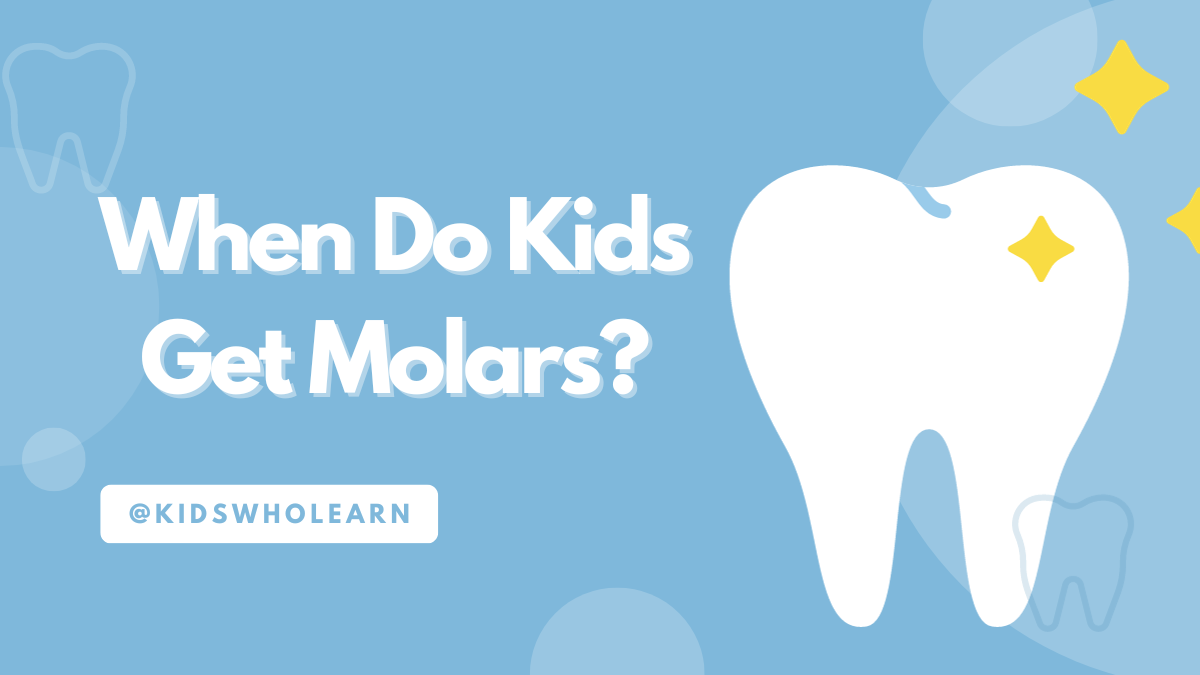If you’re a parent, you’re probably wondering when your child will start getting their molars. Molars are the large teeth located at the back of the mouth, and they’re crucial for chewing and grinding food. Your child’s first molars typically come in around the age of 6, but every child is different.
Understanding Molars
Molars are the teeth in the back of the mouth that are used for chewing and grinding food. They’re larger and stronger than other teeth, and they usually have four or five cusps or points. Molars are essential for proper digestion and nutrition, so it’s important to take care of them from an early age.
When Do Kids Get Their First Molars?
Most children get their first molars around the age of 6. These are called first molars, and they’re located at the back of the mouth on the top and bottom. However, some children may get their first molars earlier or later than this, and that’s perfectly normal.
Key Takeaways
- Molars are the teeth in the back of the mouth that are used for chewing and grinding food.
- Most children get their first molars around the age of 6.
- Every child is different, so it’s important to pay attention to your child’s development and consult a dentist if you have any concerns.
Understanding Molars
As your child grows, they will develop several sets of teeth, including their primary teeth and permanent teeth. One of the most important types of teeth that your child will develop are their molars.
Molars are large, flat teeth located in the back of the mouth that are used for grinding and chewing food. They are larger and stronger than other teeth, and have more ridges and grooves on their surface.
When Do Kids Get Molars?
Most children will develop their first molars between the ages of 12 and 15 months. These are known as the first molars or “6-year molars” because they typically emerge when a child is around 6 years old.
The second set of molars, known as the “12-year molars,” typically emerge around age 12. These are the last set of molars that your child will develop.
Caring for Molars
Because molars are used for grinding and chewing food, they are more susceptible to decay and other dental problems. It is important to take good care of your child’s molars by:
- Brushing twice a day with fluoride toothpaste
- Flossing daily to remove food particles and plaque from between teeth
- Limiting sugary and acidic foods and drinks
- Visiting the dentist regularly for check-ups and cleanings
By taking good care of your child’s molars, you can help ensure that they have a healthy, strong set of teeth that will last a lifetime.
When Do Kids Get Their First Molars
As a parent, you may wonder when your child will get their first molars. The first set of molars are very important for your child’s chewing and grinding of food. They are also important for the development of their jaw and facial structure.
Most children get their first molars between the ages of 13 and 19 months. These are called the first molars or the “6-year molars” because they typically come in before the permanent teeth at around age 6.
Here are some signs to look for when your child is getting their first molars:
- Increased drooling
- Chewing on objects
- Irritability and fussiness
- Swollen gums
- Difficulty sleeping
It’s important to remember that every child is different and may develop at their own pace. Some children may get their first molars earlier or later than others.
Once your child’s first molars come in, it’s important to start taking care of them. Regular brushing and flossing will help prevent cavities and keep your child’s teeth healthy. You may also want to consider scheduling your child’s first dental visit around this time to ensure proper dental care.
In conclusion, the first molars are an important milestone in your child’s dental development. Knowing when to expect them and how to care for them can help ensure your child’s oral health for years to come.
When Do Kids Get Their Second Molars
As your child grows, their teeth will continue to develop and change. One of the milestones in your child’s dental development is the eruption of their second molars. These teeth are located at the back of the mouth and are important for chewing and grinding food.
The eruption of second molars typically occurs between the ages of 11 and 13. However, every child is different, and the timing can vary. Some children may get their second molars earlier or later than this range.
It’s important to note that the eruption of second molars can also be affected by genetics. If you or your partner got your second molars early or late, it’s possible that your child may follow suit.
During the eruption process, your child may experience some discomfort or pain. This is normal and can be managed with over-the-counter pain relievers, such as acetaminophen or ibuprofen. You can also try using a cold compress or teething ring to help soothe your child’s gums.
In conclusion, the eruption of second molars is a natural part of your child’s dental development. While the timing can vary, it typically occurs between the ages of 11 and 13. If you have any concerns about your child’s dental health, be sure to consult with their dentist.
Signs of Molar Eruption
When your child is around 6 years old, they will start to lose their baby teeth and grow permanent ones. This is an exciting time for both parents and children, but it can also be a bit confusing. One of the most common questions parents have is when do kids get molars?
The first molars usually come in around age 6, but the second molars won’t appear until around age 12. Here are some signs that your child’s molars are starting to come in:
- Your child is chewing on things more than usual: This is because the pressure from chewing can help relieve the discomfort of teething.
- Your child is drooling more than usual: This is a common sign of teething in general, but it can be especially noticeable when molars are coming in.
- Your child is complaining of pain or discomfort in their mouth: This can be a sign that their molars are starting to come in.
- Your child’s gums are red and swollen: This is a common sign of teething, but it can be especially noticeable when molars are coming in.
- Your child is having trouble sleeping: Teething can be uncomfortable, and it can make it difficult for your child to get a good night’s sleep.
If you notice any of these signs, it’s important to be patient and understanding. Teething can be uncomfortable for your child, but it’s a normal part of growing up. Make sure your child is getting plenty of rest, and offer them soft foods that are easy to chew. You can also try giving them a cold, damp washcloth to chew on, or a teething toy to help relieve their discomfort.
How to Ease Molar Eruption Pain
Molar eruption can be a painful experience for your child. Here are some tips to help ease the pain:
- Give your child a cold teething ring or a wet washcloth to chew on. The coldness can help numb the gums and provide relief.
- Offer your child soft foods that are easy to chew, such as mashed potatoes, yogurt, or applesauce. Avoid hard or crunchy foods that can irritate the gums.
- Massage your child’s gums with a clean finger or a soft, damp cloth. This can help ease the discomfort and provide some relief.
- Use over-the-counter pain relievers such as acetaminophen or ibuprofen, but only after consulting with your child’s pediatrician. Follow the dosage instructions carefully and do not exceed the recommended dose.
- Apply a topical numbing gel to your child’s gums. These gels can be found at most drugstores and can provide temporary relief.
Remember, molar eruption is a normal part of your child’s development, and the pain will eventually subside. In the meantime, try these tips to help ease your child’s discomfort and make the process a little easier for both of you.
Caring for Your Child’s Molars
When your child’s molars start coming in, it’s important to take good care of them. Molars are the large teeth at the back of the mouth that are used for grinding food, and they play an important role in your child’s ability to chew and digest their food properly.
Here are some tips for caring for your child’s molars:
- Brush twice a day: Make sure your child brushes their teeth twice a day, including their molars. Use a soft-bristled toothbrush and fluoride toothpaste to help prevent tooth decay and keep their teeth healthy.
- Floss daily: Flossing is important for removing food particles and plaque from between teeth, including the molars. Encourage your child to floss daily, or help them if they’re not yet able to do it on their own.
- Use a mouthwash: Mouthwash can help kill bacteria and freshen breath. Choose a mouthwash that’s specifically designed for children and doesn’t contain alcohol.
- Avoid sugary foods and drinks: Sugary foods and drinks can increase the risk of tooth decay, especially in the molars. Encourage your child to eat a healthy, balanced diet that’s low in sugar.
- Visit the dentist regularly: Regular dental check-ups can help catch any problems early, before they become more serious. Make sure your child sees the dentist every six months, or as recommended by their dentist.
By following these tips, you can help keep your child’s molars healthy and strong, and ensure that they have a healthy smile for years to come.
Potential Issues with Molars
As your child grows and develops, they will eventually begin to get their molars. Molars are larger teeth located at the back of the mouth that are used for chewing and grinding food. While the arrival of molars is a natural part of the growing process, there are some potential issues that parents should be aware of.
One common issue with molars is that they can be painful for children. As molars begin to emerge, your child may experience discomfort and pain in their gums. This can make it difficult for them to eat, sleep, and go about their daily activities. To help alleviate this pain, you can try giving your child a cold teething ring or a pain reliever recommended by your pediatrician.
Another potential issue with molars is that they can be more difficult to clean than other teeth. Molars have more grooves and crevices than other teeth, which can make it easier for food particles and bacteria to become trapped. This can lead to cavities and other dental problems if not properly addressed. To help prevent this, make sure your child is brushing and flossing regularly, and consider scheduling regular dental check-ups.
Finally, molars can sometimes cause issues with speech development. This is because molars can affect the way your child’s tongue and lips move when they speak. If you notice that your child is having difficulty with speech, it may be worth consulting with a speech therapist to see if molars are the cause.
Overall, while molars are an important part of your child’s dental development, there are some potential issues to be aware of. By staying vigilant and taking steps to address any issues that arise, you can help ensure that your child’s molars come in smoothly and without any major problems.
When to Consult a Dentist
While most children will experience some discomfort when their molars start to come in, there are some instances where you should consult a dentist. Here are a few situations where it’s a good idea to seek professional advice:
1. Delayed Tooth Eruption
If your child is over two years old and hasn’t yet started getting their molars, it’s a good idea to consult a dentist. While every child is different, a significant delay in tooth eruption could be a sign of a more serious problem.
2. Pain and Discomfort
While some discomfort is normal when molars are coming in, severe pain or discomfort that lasts for more than a few days could be a sign of an issue. If your child is experiencing significant discomfort, it’s best to consult a dentist to ensure that there are no underlying problems.
3. Bleeding or Swollen Gums
If your child’s gums are bleeding or swollen, it could be a sign that their molars are coming in improperly. In some cases, this could be a sign of gingivitis or other gum diseases. If you notice any bleeding or swelling, it’s best to consult a dentist.
4. Abnormal Tooth Growth
If your child’s molars are growing in abnormally, it could be a sign of a more serious problem. For example, if a molar is growing in sideways, it could cause problems with your child’s bite. If you notice any abnormal tooth growth, it’s best to consult a dentist to ensure that there are no underlying issues.
In general, it’s a good idea to consult a dentist if you have any concerns about your child’s molars. A dentist can help ensure that your child’s teeth are growing in properly and can address any issues that may arise.
Conclusion
In conclusion, molars are an important part of a child’s dental development. They typically start to come in around the age of 6, but can vary from child to child. It’s important to remember that every child is different and will develop at their own pace.
As a parent, it’s important to keep an eye on your child’s dental health and make sure they are brushing and flossing regularly. Regular visits to the dentist can also help catch any potential dental issues early on.
If you have any concerns about your child’s dental development, don’t hesitate to speak with your child’s dentist. They can provide you with valuable information and guidance on how to ensure your child’s teeth are healthy and strong.
Remember, taking care of your child’s teeth now can help set them up for a lifetime of good dental health.
Frequently Asked Questions
At what age do children typically get their back molars?
Children usually get their first set of molars, also known as the six-year molars, between the ages of 5 and 7 years old. The second set of molars, known as the 12-year molars, usually come in between the ages of 11 and 14 years old.
What are the symptoms of teething molars in a 3-year-old?
Teething molars in a 3-year-old can cause symptoms such as irritability, drooling, biting or chewing on objects, and swollen gums. Some children may also experience mild fever and mild pain.
Can a 4-year-old child get their molars?
Yes, it is possible for a 4-year-old child to get their molars. However, it is more common for children to get their first set of molars between the ages of 5 and 7 years old.
What are the signs of 5-year-old molars coming in?
The signs of 5-year-old molars coming in include swollen and tender gums, irritability, drooling, and biting or chewing on objects. Some children may also experience mild fever and mild pain.
How long does it take for a 7-year-old’s tooth to grow back?
It can take up to a few months for a 7-year-old’s tooth to grow back after it falls out. However, the exact time frame can vary depending on the child and the specific tooth.
What are the symptoms of 9-year-old molar pain?
The symptoms of 9-year-old molar pain can include sensitivity to hot and cold, pain while chewing, and swelling or redness around the affected area. It is important to consult a dentist if the pain persists or worsens.







